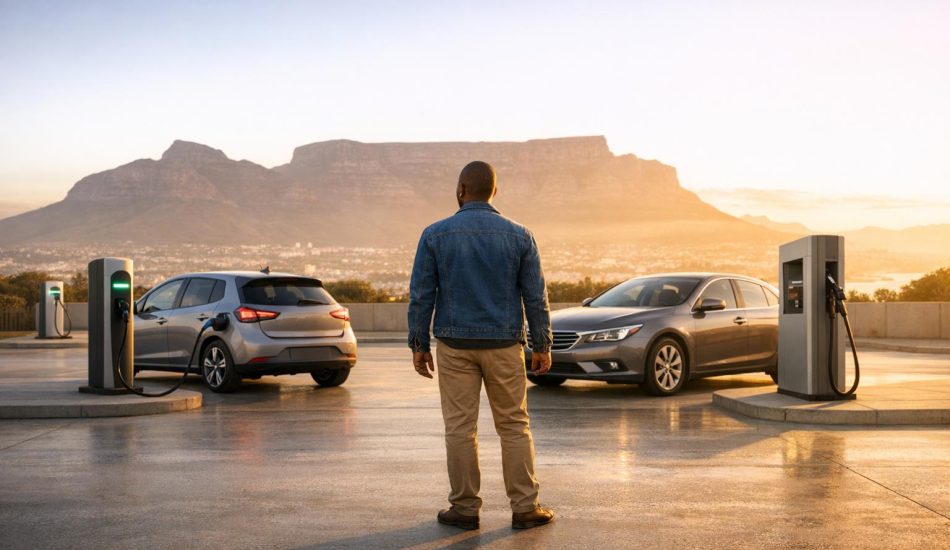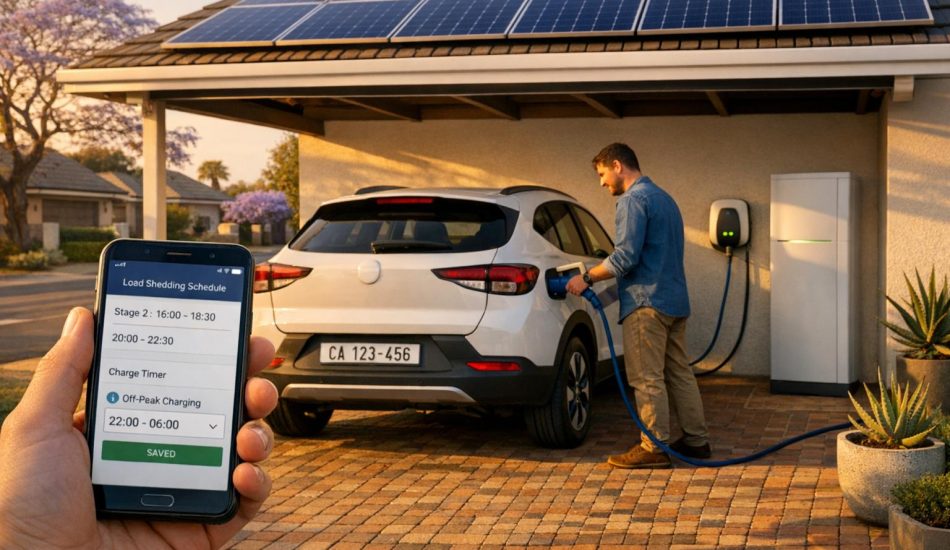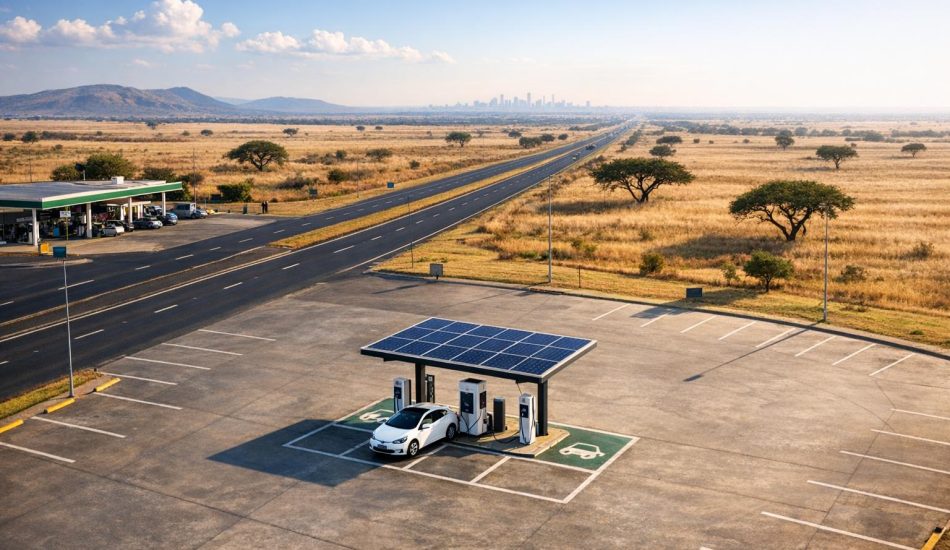
Importing electric vehicles (EVs) to Nigeria in 2025 is now easier and more cost-effective, thanks to new regulations and incentives. Here’s what you need to know:
- New Rules: The Electric Vehicle Transition and Green Mobility Bill, 2025 mandates foreign manufacturers to partner with local assemblers and meet specific production targets. Non-compliance can lead to fines up to ₦500 million.
- Tax Exemptions: EVs are exempt from Import Adjustment Tax (0%) and VAT (0%), but a 15% National Automotive Council levy and 10-20% import duty still apply.
- Standards: Imported EVs must meet Euro II emission standards and pass SONCAP certification to ensure safety and quality.
- Logistics: Shipping takes 30–45 days, with container shipping offering better protection. Required documents include a bill of lading, SONCAP certificates, and Form M registration.
- Costs: Total import costs depend on the vehicle price, shipping, duties, and local transportation. Planning for these expenses is critical.
Nigeria’s 2025 EV Import Rules and Requirements
This section highlights Nigeria’s efforts to promote cleaner transportation by outlining the country’s electric vehicle (EV) import rules set for 2025. These regulations include fees, standards, and key conditions for entering the market.
The Electric Vehicle Transition and Green Mobility Bill, 2025
The Electric Vehicle Transition and Green Mobility Bill, 2025 is Nigeria’s boldest legislative move toward embracing electric mobility. Already through its second reading in the Senate, the bill introduces major changes for foreign companies aiming to participate in the Nigerian EV market.
Under the bill, foreign manufacturers must collaborate with licensed local assemblers and establish assembly plants within three years to qualify for incentives. By 2030, at least 30% of components used in EV production must be sourced locally, ensuring that Nigeria’s manufacturing sector gains from the shift to electric vehicles. Additionally, EV assemblers are required to produce a minimum of 5,000 units annually, meeting international safety and technical standards.
"This bill will help Nigeria move from dependence on fossil fuels toward a cleaner and sustainable energy system. It will ensure that our local industries benefit directly from the global electric vehicle market, create jobs, and reduce emissions in our cities." – Senator Orji Uzor Kalu
Non-compliance with the bill’s provisions comes with heavy penalties. Foreign automakers who fail to meet the requirements could face fines of up to ₦250 million per breach, while unlicensed EV importers risk ₦500 million fines and possible confiscation of goods.
Tax Breaks, Waivers, and Import Duties
Nigeria has introduced financial incentives to make EV imports more appealing than traditional vehicles. For instance, EVs are completely exempt from the Import Adjustment Tax (IAT) and Value Added Tax (VAT), leading to significant cost reductions.
| Fee Type | Rate | Status |
|---|---|---|
| Import Adjustment Tax (IAT) | 0% | Exempt |
| Value Added Tax (VAT) | 0% | Exempt |
| National Automotive Council (NAC) Levy | 15% | Mandatory |
| Import Duty | 10% – 20% | Varies by vehicle type |
The bill also proposes additional perks like tax holidays, import duty waivers, road tax reliefs, toll exemptions, and EV subsidies. These incentives aim to encourage both private and commercial adoption of electric vehicles.
If you’re planning to import EVs, take advantage of these exemptions to lower your costs. The IAT and VAT exemptions alone make EV imports more affordable than conventional vehicles.
Meeting Environmental and Technical Standards
To gain entry into Nigeria, imported EVs must comply with the country’s minimum Euro II emission standards and secure approvals under the Standards Organisation of Nigeria Conformity Assessment Program (SONCAP). This process requires two key documents: a Product Certificate (PC) and a Shipment Certificate (SC), both of which are essential for customs clearance.
The SONCAP certification process involves rigorous inspection and testing to ensure compliance with Nigerian safety and quality standards. It’s important to account for this in your planning, as obtaining SONCAP approval can add several weeks to your import timeline. Collaborating with certified inspection agencies in the country of origin can help streamline this process and avoid delays at Nigerian ports.
These standards aren’t just formalities – they’re designed to protect consumers and ensure imported EVs are safe and suitable for Nigerian roads. Addressing these requirements upfront can save time and prevent costly setbacks, including shipment rejection at customs. With these regulations and technical standards in place, the next steps will guide you through the import process.
How to Import EVs: Step-by-Step Process
Bringing electric vehicles (EVs) into Nigeria involves several key steps: selecting models suitable for local conditions, finding trustworthy suppliers, gathering the necessary documents, and managing shipping logistics. This process aligns with Nigeria’s evolving EV regulations and ensures a smoother import experience.
Research and Choose the Right EV Models
Start by selecting EV models that can handle Nigeria’s unique road conditions. Look for vehicles that meet SONCAP and Euro II standards, as these are essential for compliance.
Focus on models with high ground clearance to navigate potholes, speed bumps, and uneven terrain. An EV with a range of at least 250 miles and LFP batteries is ideal, as these batteries are better suited for Nigeria’s hot climate.
Additionally, prioritize vehicles with durable suspension systems and ensure there’s a reliable local servicing network. Compatibility with local charging standards and access to spare parts are also critical factors to consider, saving you potential headaches down the line.
Find Reliable EV Suppliers
Partnering with reliable suppliers is crucial to avoid unnecessary delays or complications. Look for suppliers with a strong track record of exporting to Africa and a clear understanding of Nigeria’s import requirements.
For example, EV24.africa specializes in African EV imports, offering direct relationships with manufacturers, transparent pricing, and flexible payment options.
When evaluating suppliers, ask for references from customers who have imported EVs into Nigeria or nearby countries. Verify credentials through trade associations or export registries, and consider using third-party inspection services to confirm the quality of the vehicles before shipment. Many successful imports have been attributed to such inspections, which help ensure timely delivery and smooth customs clearance.
Required Documents and Customs Clearance
Accurate documentation is essential for avoiding delays at Nigerian ports. Missing or incorrect paperwork can lead to costly setbacks, so make sure you have the following:
- A business registration certificate and tax identification number (TIN) to confirm your legal status as an importer.
- A final invoice from your supplier.
- The bill of lading from the shipping company.
- A certificate of origin to verify where the vehicle was manufactured.
- A detailed packing list.
You’ll also need SONCAP certificates, including the Product Certificate (PC) and Shipment Certificate (SC), to meet Nigerian safety and quality standards. Marine insurance is another must-have to protect your investment during transit.
Additionally, complete the Form M registration with the Central Bank of Nigeria before your shipment departs. This step is critical for customs clearance. To ensure everything is in order, consider working with experienced customs brokers who can help review and validate your documents.
Shipping, Insurance, and Delivery
Shipping EVs to Nigeria typically takes 30–45 days, depending on port and customs conditions. Main entry points include Lagos (Tin Can Island) and Port Harcourt.
It’s essential to secure marine insurance that covers theft, damage, and loss from departure to final delivery. Always request a copy of the insurance certificate to confirm the coverage details before shipping.
For EVs, container shipping is often the preferred method because it provides better protection against weather and reduces handling-related damage. However, roll-on/roll-off (RoRo) shipping can be a more affordable option for larger shipments, provided adequate safeguards are in place.
Companies like EV24.africa offer door-to-door delivery services, managing everything from port pickup to final delivery. Building relationships with local clearing agents ahead of time can also help expedite customs clearance and address any unexpected issues that may arise.
Complete Cost Breakdown for EV Imports
Bringing in an electric vehicle (EV) involves more than just the sticker price. To budget effectively, you’ll need to factor in the vehicle’s cost, duties, taxes, and various logistics fees. Let’s break down the key expenses involved in importing an EV.
Import Duties, Taxes, and Government Fees
One of the perks of importing EVs is their lower import duties compared to gasoline-powered vehicles. Passenger EVs typically enjoy reduced rates, though commercial and luxury models may face steeper charges. Beyond duties, there are additional regulatory fees, such as processing costs, which depend on the vehicle’s specifications and the port of entry.
Port Charges and Shipping Costs
Shipping costs can range widely, depending on the departure port, shipping method, and any special handling requirements. For instance:
- Container Shipping: Offers better protection for vehicle components but comes at a higher price.
- Roll-on/Roll-off (RoRo) Shipping: A more affordable option, though it provides less security for the vehicle.
Once the EV reaches the port, there are terminal handling fees, storage costs (after any free storage period), and documentation fees. Customs delays can sometimes lead to extra charges like demurrage fees. Additionally, marine insurance – calculated as a percentage of the vehicle’s CIF (Cost, Insurance, and Freight) value – ensures the car is covered from the moment it leaves its origin until it arrives. Finally, local transportation costs will depend on the distance from the port to the final destination.
Cost Estimation Calculator
Here’s a snapshot of the key cost components to consider when estimating your total expenses:
| Cost Component | Description | Passenger EV (Example) | Commercial EV (Example) |
|---|---|---|---|
| Vehicle Purchase Price | Base cost of the vehicle | [Example Value] | [Example Value] |
| Shipping & Insurance | Shipping fees plus marine insurance | [Estimate] | [Estimate] |
| Import Duty | Duties based on the EV type | [Estimate] | [Estimate] |
| Regulatory Levies | Additional charges and fees | [Estimate] | [Estimate] |
| Certification & Customs | SONCAP, inspection, and processing fees | [Estimate] | [Estimate] |
| Port Charges | Handling, storage, and documentation fees | [Estimate] | [Estimate] |
| Local Transportation | Delivery cost from port to destination | [Estimate] | [Estimate] |
| Total Estimated Cost | Combined sum of all components | [Total Estimate] | [Total Estimate] |
Keep in mind that actual costs can vary due to market conditions, specific vehicle details, and processing times. For a more precise estimate, EV24.africa provides tools and resources to help you calculate these expenses. They also offer insights into potential extra costs, like extended storage or expedited customs processing, so you’re not caught off guard.
Lastly, don’t overlook the impact of currency exchange rates. Since some fees are denominated in local currency, fluctuations can affect your total cost. Many importers use strategies like forward contracts to manage this risk and keep costs predictable.
sbb-itb-99e19e3
Common Import Challenges and Solutions
Navigating the challenges of importing can save both time and money if approached with the right strategies.
Manage Port Delays and Customs Issues
Congestion at Nigerian ports is a frequent issue, often leading to extended delivery times and higher costs. To avoid unnecessary delays, begin the customs clearance process as early as possible. Ensure all required documents – such as the SONCAP certificate, bill of lading, commercial invoice, and packing list – are complete and accurate. Hiring a specialized customs agent can help address potential hurdles like valuation discrepancies. Additionally, scheduling shipments during less busy periods at the ports can further minimize delays. These steps can help keep your shipments moving efficiently.
Navigating Nigeria’s Charging and Road Infrastructure
Electric vehicle (EV) charging infrastructure in Nigeria is still evolving, with most facilities concentrated in major cities. Before importing, confirm that your EV’s charging system is compatible with local stations. Variations in connector types and occasional power supply challenges mean it’s wise to consider backup options, such as home charging setups. Road conditions also vary widely across the country, so it’s important to evaluate whether your EV’s design, including ground clearance, is suitable for local driving environments. Ensuring your vehicle aligns with these infrastructure realities helps avoid operational headaches after import.
Vehicle Registration and Road Compliance
Once your vehicle clears customs and infrastructure considerations, proper registration and compliance are essential for legal road use. Verify that your vehicle meets local standards, including SONCAP certification and inspections at authorized centers. Insurance for EVs may differ from traditional vehicles, so it’s best to work with providers experienced in EV coverage. While registration fees are generally comparable to those for conventional vehicles, some regions may offer incentives for EVs. For commercial vehicles, check for any additional driver or certification requirements. Keep all documentation organized for future compliance needs.
Key Points for Successful EV Imports
Successful electric vehicle (EV) imports hinge on three main factors: staying compliant with regulations, detailed cost planning, and smart supplier selection. The Electric Vehicle Transition and Green Mobility Bill, 2025 has reshaped the import process, demanding strict adherence to certification and environmental standards. Non-compliance can lead to hefty penalties of up to ₦500 million. These requirements form the backbone of the regulatory framework for importing EVs.
Navigating regulations is the first step in a successful import strategy. EVs must meet Euro II standards and secure SONCAP certification, complete with all necessary documentation, to avoid delays. This strict system emphasizes the importance of precision in cost planning and selecting the right suppliers.
Thorough cost planning is essential. While EVs enjoy exemptions from VAT and Import Adjustment Tax, other expenses remain significant. Additionally, the enforcement of minimum clearing costs makes careful financial preparation even more critical.
Selecting the right supplier and vehicle models is another key factor. For example, the government’s 2023 agreement to bring in 12,000 electric buses from Yutong highlights the importance of working with experienced suppliers who understand the Nigerian market. Importers should prioritize EV models with features like high ground clearance, long battery ranges, and reliable service options to handle Nigeria’s varied road conditions and the evolving charging infrastructure.
Specialized platforms such as EV24.africa simplify the process of vetting suppliers, managing documentation, and handling customs clearance. With transparent pricing and a wide selection of trusted brands, EV24.africa provides access to vehicles designed for Nigerian conditions. Their operations across all 54 African markets offer valuable local expertise, especially for first-time importers.
The Nigerian vehicle market is growing rapidly, with an 18.9% increase in 2023, reaching 13,304 units. This growth presents significant opportunities for EV imports, but success in this competitive space demands careful planning, dependable partnerships, and strict compliance with evolving regulations.
FAQs
What benefits does the Electric Vehicle Transition and Green Mobility Bill, 2025 offer to foreign manufacturers and local assemblers in Nigeria?
The Electric Vehicle Transition and Green Mobility Bill, 2025 introduces a range of incentives designed to accelerate the growth of Nigeria’s electric vehicle (EV) sector. These incentives include tax holidays, import duty waivers, toll exemptions, and subsidies for EVs, all aimed at encouraging both adoption and investment in the industry.
For international manufacturers eyeing the Nigerian market, the bill requires them to collaborate with licensed local assemblers and establish assembly plants within Nigeria within three years. Furthermore, starting in 2030, at least 30% of the components used in EV production must be sourced locally. This approach is geared toward strengthening local production capabilities and building a thriving supply chain. Together, these measures are shaping a forward-thinking EV ecosystem in Nigeria.
What steps should I take to ensure the electric vehicles I import comply with Nigeria’s SONCAP certification and Euro II emission standards?
To meet Nigeria’s SONCAP certification and Euro II emission standards for electric vehicles, you’ll need to navigate a few key regulatory steps. First, secure a Product Certificate (PC) and a Shipment Certificate (SC) through the Standards Organisation of Nigeria Conformity Assessment Program (SONCAP). These certificates confirm that your vehicles align with Nigeria’s safety and quality requirements.
On top of that, ensure the vehicles comply with Euro II emission standards, which set limits on vehicle emissions. Work closely with your supplier to verify compliance and gather all required documentation before shipping. These precautions can help you sidestep potential delays, fines, or even rejection during the import process.
What are the best ways to manage costs and handle logistics when importing electric vehicles to Nigeria, especially with shipping and customs challenges?
To keep costs in check and simplify the logistics of importing EVs to Nigeria, teaming up with a seasoned freight forwarder can be a game-changer. These professionals are skilled at navigating the often-complicated shipping processes, managing customs paperwork, and ensuring everything aligns with Nigerian import regulations.
It’s also smart to plan ahead by digging into tariffs, duties, and shipping fees. This upfront research allows for more accurate budgeting. On top of that, working with dependable suppliers and locking in all logistics details early can help you avoid unexpected delays and extra costs. Focusing on these steps can make the entire import process smoother and more budget-friendly.




